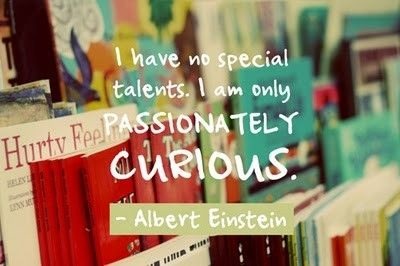How to Cultivate Curiosity

Everybody is born curious. For some strange reason, we strip the curiosity out of each other. We tell our children not to touch that unused keyboard, don’t play in the dirt, don’t mix orange juice in your cereal. Sometimes we have valid reasons for prohibiting certain things to kids, but sometimes we don’t. And when we have those valid reasons, we don’t even take the time to share them with the little ones. They must stick with a classic ” Because I said so!”
It really wouldn’t hurt them to find out for themselves that certain liquids don’t mix well with Cheerios. Why do we try so hard to stop them from experimenting? Why do we limit the responsibility of our learning only to institutions which hardly give us a chance to apply what we learn in the real world?
When did education stop creating people who make questions and create their own answers and to leave us with a whole bunch of rule following standardized test takers?
The silver lining lies in the fact that it’s never too late to be curious. You just have to get back in touch with your sense of wonder and creativity!

Pencil Vs Camera by Ben Heine
Let’s begin on knowing what curiosity really means. According to Experiencelife.com, it’s a state of active interest or genuinely wanting to know more about something. The more you want to know about something and the more you really learn about that something you become a lot more open to new and different experiences. You realize that you can actually achieve things that you hadn’t thought of before. Now that’s pretty empowering.
We feel alive and engaged, more capable of embracing opportunities, making connections, and experiencing moments of insight and meaning — all of which provide the foundation for a rich, aware and satisfying life experience.- Todd Kashdan.
There are five main ways in which curiosity enhances the quality of our lives:
1. Health: Keeps your mind healthy and young by always thinking, learning, questioning and exploring!
2. Intelligence: Scientifically proven that highly curious toddlers would have higher IQs as older children. High levels of curiosity in adults translates into greater analytic ability, problem-solving skills and overall intelligence.
3. Social Relationships: Having genuine interest in knowing more about others helps you maintain satisfying significant relationships. Curious people tend to ask questions, take interest and keep interactions engaging and playful.
4. Happiness: Cultivating curiosity and being open to new experiences will increase our likelihood of actually finding surprising and satisfying activities.
5. Meaning : Curiosity can serve as a gateway to life’s greatest sources of meaning and satisfaction: our interests, hobbies and passions.

So now, let’s move on and find out how to become more curious!
Build knowledge. Knowledge opens our eyes to interesting facts about what we don’t know. If you want to be curious, start accumulating knowledge.
Thrive on uncertainty. People who take part in new and uncertain activities are happier and find more meaning in their lives than people who rely on the familiar. It becomes specially satisfying when you realize you’ve conquered something you were uneasy about.
Reconnect with play. We can add playfulness to almost any task. A playfull attitude naturally builds interest and curiosity. Turning something boring into a game makes things more interesting for pretty much everyone.
Find the unfamiliar in the familiar. One way to become more curious is to intentionally forget expectations, labels and assumptions about “seemingly” familiar activities and events. Sometimes we don’t do things because we already expect something not so amazing from them, but these are mere assumptions. Do those things anyways and allow your mind to be blown! Judge these experiences on how you lived them rather than what you had previously assumed.
So there you go! You have no excuse to admit that you’re bored and that your life has lost excitement. You’re the one who has lost curiosity. Re-gain it!







